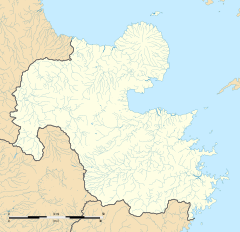Bungo-Taketa Station (豊後竹田駅, Bungo-Taketa-eki) is a passenger railway station located in the city of Taketa, Ōita Prefecture, Japan. It is operated by JR Kyushu.[1][2]
 Bungo-Taketa Station in 2024 | |||||||||||
| General information | |||||||||||
| Location | Aiai, Taketa-shi, Ōita-ken 878-0011 Japan | ||||||||||
| Coordinates | 32°58′15″N 131°23′24″E / 32.97083°N 131.39000°E | ||||||||||
| Operated by | |||||||||||
| Line(s) | ■ Hōhi Main Line | ||||||||||
| Distance | 88.0 km from Kumamoto | ||||||||||
| Platforms | 1 island platform | ||||||||||
| Tracks | 2 + numerous sidings | ||||||||||
| Construction | |||||||||||
| Structure type | Side hill cutting | ||||||||||
| Other information | |||||||||||
| Status | Staffed (Midori no Madoguchi) | ||||||||||
| Website | Official website | ||||||||||
| History | |||||||||||
| Opened | 15 October 1924 | ||||||||||
| Previous names | Bungo-Takeda (until 1 October 1969) | ||||||||||
| Passengers | |||||||||||
| FY2016 | 375 daily | ||||||||||
| Rank | 277th (among JR Kyushu stations) | ||||||||||
| Services | |||||||||||
| |||||||||||
| |||||||||||
Lines
editThe station is served by the Hōhi Main Line and is located 88.0 km from the starting point of the line at Kumamoto.[3]
Layout
editThe station consists of an island platform serving two tracks on a side hill cutting. The station building is a wooden structure of traditional Japanese design located at a lower level. It houses a waiting room and a JR Kyushu Midori no Madoguchi staffed ticket window . Access to the platform is by means of an underpass which leads beneath and up to the platform. Several sidings run to the north of the platform.[2][3][4]
Platforms
edit| 1, 2 | ■ ■ Hōhi Main Line | for Miyaji, Higo-Ōzu and Kumamoto for Ōita |
-
A view of the sidings north of the platform.
-
Platform at night
History
editJapanese Government Railways (JGR) had opened the Inukai Light Rail Line (犬飼軽便線) (later Inukai Line) from Ōita to Nakahanda on 1 April 1914. The track was extended westwards in phases, with this station opening as the new western terminus on 15 October 1924 with the name Bungo-Takeda (same kanji characters but with a different reading). It became a through-station on 30 November 1925 when the line was extended to Tamarai. By 1928, the track had been extended further west and had linked up with the Miyagi Line (宮地線) reaching eastwards from Kumamoto. On 2 December 1928, the entire track from Kumamoto through this station to Ōita was designated as the Hōhi Main Line. On 1 October 1969, the reading of the station name was changed to Bungo-Taketa, with no change to the Kanji characters. With the privatization of Japanese National Railways (JNR), the successor of JGR, on 1 April 1987, the station came under the control of JR Kyushu.[5][6]
On 17 September 2017, Typhoon Talim (Typhoon 18) damaged the Hōhi Main Line at several locations. Services between Aso and Nakahanda, including Bungo-Taketa, were suspended and replaced by bus services. Rail service from Aso through this station to Miemachi was restored by 22 September 2017[7] Normal rail services between Aso and Ōita were restored by 2 October 2017.[8]
Passenger statistics
editIn fiscal 2016, the station was used by an average of 375 passengers daily (boarding passengers only), and it ranked 277th among the busiest stations of JR Kyushu.[9]
Surrounding area
edit- Takeda City Hall
See also
editReferences
edit- ^ "JR Kyushu Route Map" (PDF). JR Kyushu. Retrieved 23 February 2018.
- ^ a b "豊後竹田" [Bungo-Taketa]. hacchi-no-he.net. Retrieved 17 April 2018.
- ^ a b Kawashima, Ryōzō (2013). 図説: 日本の鉄道 四国・九州ライン 全線・全駅・全配線・第6巻 熊本 大分 エリア [Japan Railways Illustrated. Shikoku and Kyushu. All lines, all stations, all track layouts. Volume 6 Kumamoto Ōita Area] (in Japanese). Kodansha. pp. 38, 79. ISBN 9784062951654.
- ^ "豊後竹田駅" [Bungo-Taketa Station]. jr-mars.dyndns.org. Retrieved 17 April 2018. See images of tickets sold.
- ^ Ishino, Tetsu; et al., eds. (1998). 停車場変遷大事典 国鉄・JR編 [Station Transition Directory – JNR/JR] (in Japanese). Vol. I. Tokyo: JTB Corporation. p. 228. ISBN 4-533-02980-9.
- ^ Ishino, Tetsu; et al., eds. (1998). 停車場変遷大事典 国鉄・JR編 [Station Transition Directory – JNR/JR] (in Japanese). Vol. II. Tokyo: JTB Corporation. pp. 745–6. ISBN 4-533-02980-9.
- ^ "豊肥本線の運休区間が縮小…阿蘇~三重町間再開" [Zone of suspended services on Hōhi Main Line reduced. Aso to Miemachi reopens]. Response.jp. 22 September 2017. Archived from the original on 2 October 2017. Retrieved 15 April 2018.
- ^ "10 月2日(月)からの日豊本線・豊肥本線の運転計画について(お知らせ)" [Operations plan for Nippo Main Line and Hōhi Main Line (notice)] (PDF). JR Kyushu. 29 September 2017. Archived from the original (PDF) on 30 September 2017. Retrieved 1 October 2017.
- ^ "駅別乗車人員上位300駅(平成28年度)" [Passengers embarking by station - Top 300 stations (Fiscal 2016)] (PDF). JR Kyushu. 31 July 2017. Archived from the original (PDF) on 1 August 2017. Retrieved 3 March 2018.
External links
editMedia related to Bungo-Taketa Station at Wikimedia Commons
- Bungo-Taketa (JR Kyushu)(in Japanese)


